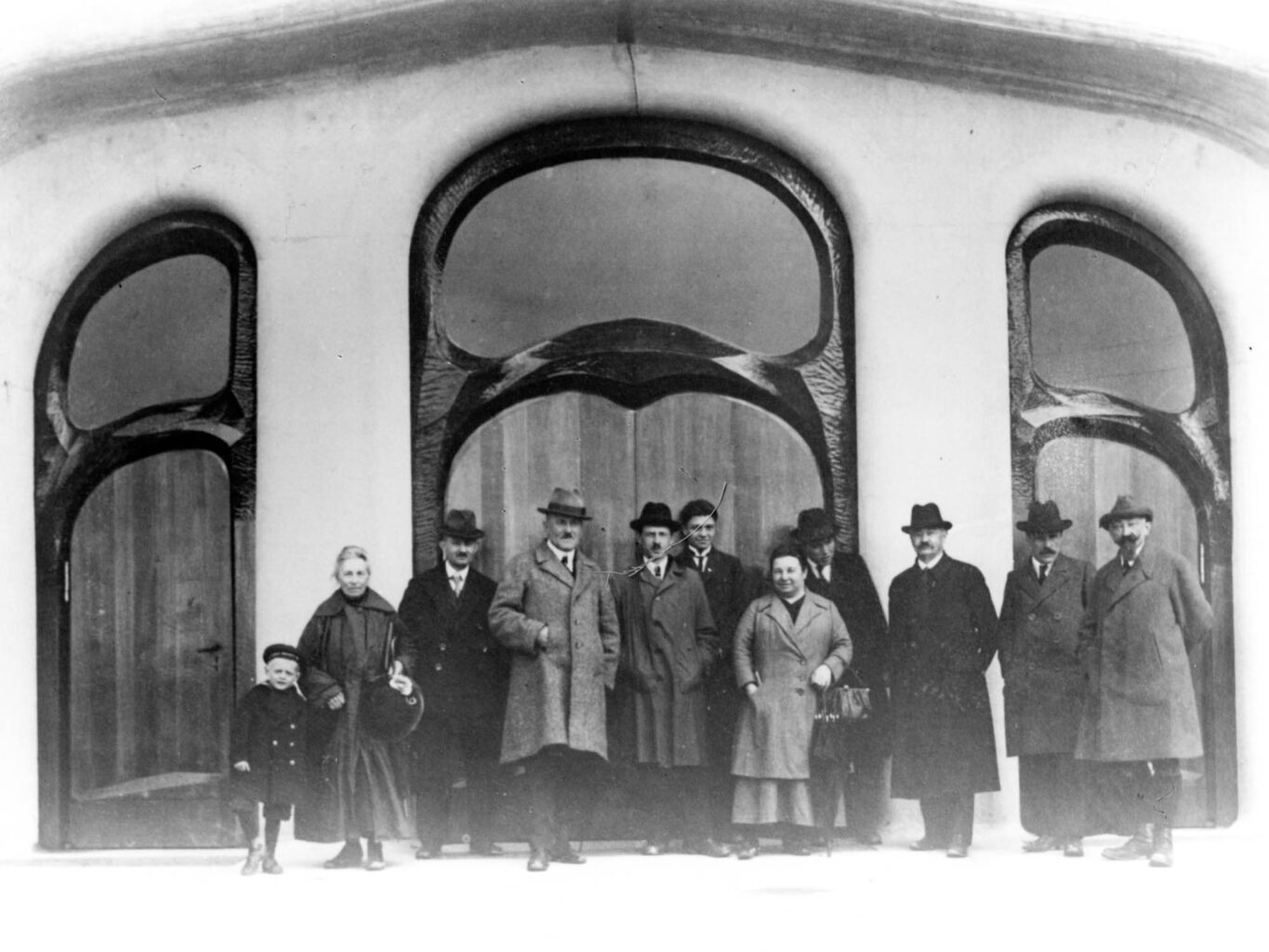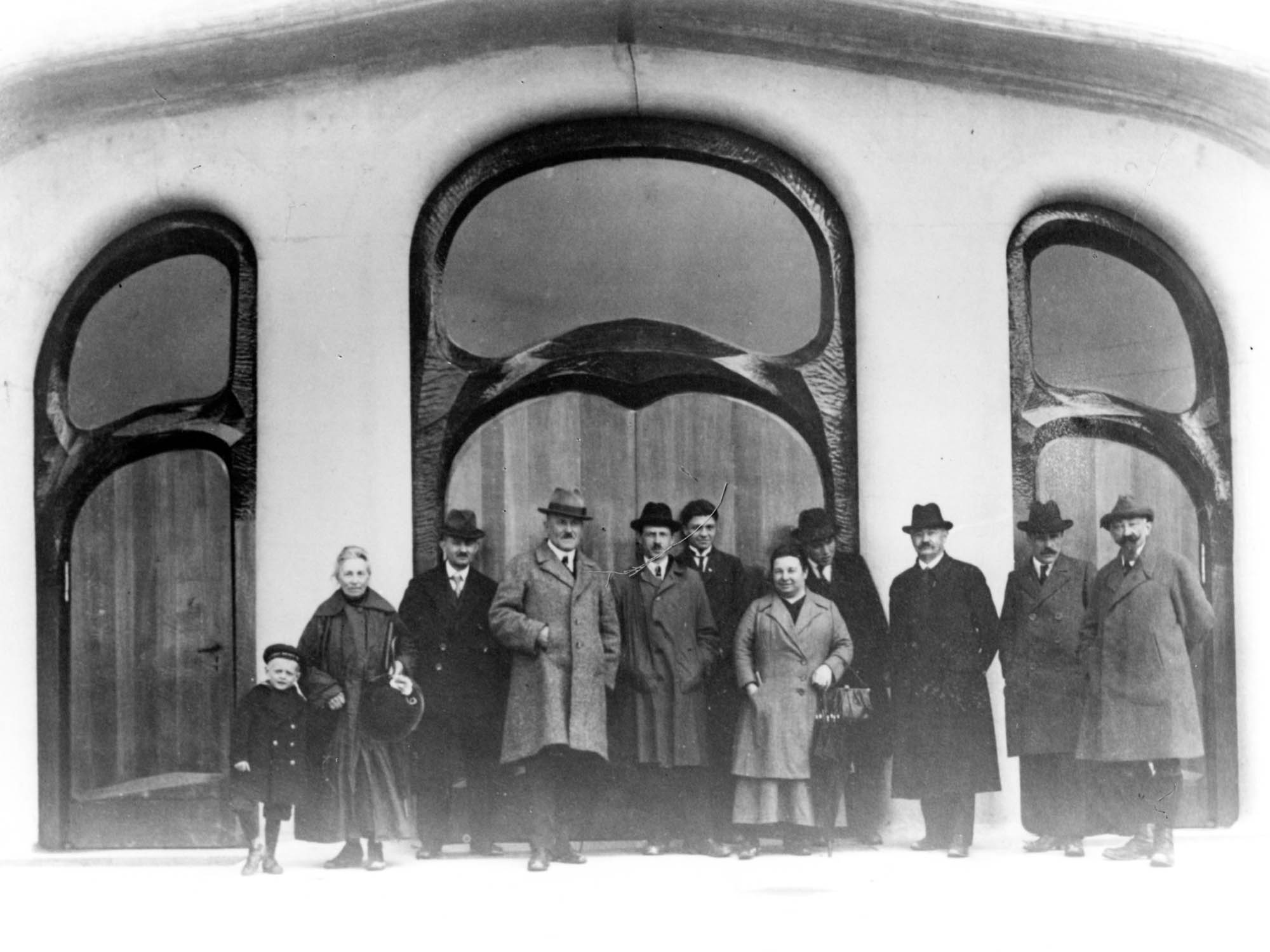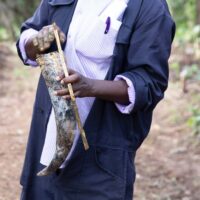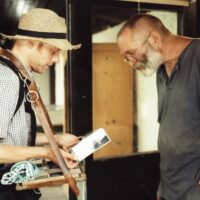From April 15 to 22, 1923, a course for Swiss teachers was held in the carpentry workshop (Schreinerei) right next to the ruins of the burnt down first Goetheanum. A group of Czech teachers also travelled to Dornach for the course.
During that week, Rudolf Steiner gave eight lectures (GA 306) and additional talks were given by Walter Johannes Stein, Ernst Blümel, Hermann von Baravalle, and Caroline von Heydebrand. An article in the Bern school newsletter (Berner Schulblatt) described the mediating role played by these Waldorf teachers and their lectures: “Those who still wish to be called Dr. Steiner’s pupils, who have internalized anthroposophic pedagogy, built a kind of bridge for us to Dr. Steiner. The fact that such teachers and individualities can grow from the almost superhuman content offered by Dr. Steiner means that we can approach anthroposophy with confidence and hope. They were there for us throughout the day, for individuals, small groups or in the general discussions” (Das Goetheanum, 1923, vol. 2, p. 357). The course was attended by around 80 Swiss and 30 foreign teachers, as well as 50 parents. Among the foreign teachers were twelve visitors from Czechoslovakia. Below is a brief outline of the circumstances of their attendance.
The very first lecture Rudolf Steiner gave in Prague on February 20, 1907, was of a pedagogical nature: The Education of the Child in the Light of Spiritual Science. A Czech translation was published in the same year. In the following year, on November 18, 1908, Rudolf Steiner spoke about Man, Woman and Child in the Light of Spiritual Science and again addressed questions of education. It was not until 1923 that Rudolf Steiner visited Prague for the first time after the founding of the Waldorf School. On April 28 of that year, he lectured on Walking, Speaking, and Thinking in Relation to the World of the Hierarchies – The Three Stages of the Soul’s Awakening, and on April 30, 1923, his subject was Human Evolution and Human Education in the Light of Anthroposophy. His last public lecture in Prague was again devoted to education. It was held on April 4, 1924, and was entitled Education and Teaching Based on True Knowledge of the Human Being.
One of Rudolf Steiner’s most active students in Prague, Julie Klímová, who was married to the high-ranking civil servant Jaroslav Klíma, tried to organize a group trip to the teachers’ course in Dornach in April 1923, motivated by the idea of founding a Waldorf School in Czechoslovakia. Through her husband, she had connections to the Education Department in her country. Since she herself did not know any suitable teachers, she asked one of these civil servants, undersecretary Josef Černý, to furnish her with the names of spiritually or religiously minded teachers whom she could prepare for teaching in the Waldorf School. Without knowing any of them personally, she sent every teacher and school inspector a book on Waldorf Education (The Teachers’ Course of Dr. Rudolf Steiner at the Goetheanum, 1922) and soon after invited them to attend the course in Dornach in April 1923. She even offered to cover everyone’s expenses including accommodation, using the funds she had raised herself for the purpose. Among those invited was the theosophist and writer Pavla Moudrá, with whom Julie Klímová had been in correspondence since 1922 about the founding of a Waldorf school. “I have the following plan: I would like to initiate a Czech or Slovakian school in accordance with the intentions of Dr. Rudolf Steiner, whose educational principles are in the spirit of Comenius. Anyone who is as serious about the Waldorf School as I am, must be convinced that it is the only way to bring light to the current chaotic situation” (Letter to Moudrá of September 26, 1922). In a further letter, written on October 15, 1922, she even confided, “I am no longer concerned that I may not have the teachers to put my ideas into practice – not if personalities like you are getting in touch.”
Moudrá had offered to teach in a Czech Waldorf school once it was established. She was not only a writer but known above all in Czechoslovakia as a translator. Her extraordinary linguistic skills enabled her to translate from English, French, German, Russian, Swedish, and other languages. Most important, however, was her extensive civic engagement. She worked in organization and publication for an animal welfare association, in the Chelčický Peace Society, and in movements for feminism, vegetarianism and temperance. In all fields she was an untiring pioneer, doing what she could toward the spiritual elevation of human life. Her public activities arose from the firm beliefs she had derived from her theosophical studies, and she also presented her enlightened views in the Theosophical Society, which she had joined in 1904 and where she gave a lecture every year from 1906. In November 1907, she was admitted by Rudolf Steiner to the third Section of the Esoteric School (R. Steiner, GA 265, p. 58).

Twelve individuals accepted Klímová’s generous invitation, of whom only two were teachers, alongside three inspectors. The selection of participants in itself suggests that this visit did not have the desired outcome, despite all her efforts. Pavla Moudrá, for instance, turned up at Prague Central Station with her young adopted child Lála, whom, of course, she had to look after during their entire stay in Dornach. This is how B. Večerek described the opening of the course: “Mrs Klímová introduced us to Dr. R. Steiner and talked with him for a while in our presence. Tears glistened in the eyes of those who remembered the first, wooden Goetheanum building. The noise of speeding cars on the road between Arlesheim to Basel dimly rose to our hill. After a while we walked through the carpentry workshop and entered the auditorium. I sat down on one of the chairs along the central aisle. […] Next to me was a stage with a lectern. The room filled up quickly. The stenographer took a seat by the stage and switched on a lamp that cast a gentle light. The noise in the room died down. Dvořák’s Slavonic Dance floated through the room and the eurythmists gave it expression through movement. Suddenly Dr. R. Steiner appeared at the lectern and his words resounded. […] He welcomed the Swiss teachers from the various types of schools for whom the course had been organized, mentioning in particular Mrs. Julia Klímová and the Czech teachers she had brought with her.”
The photo was taken on the group’s second day in Dornach by Václav Rohlena, a remedial teacher in Prague-Libeň. “It was the last time I saw him in Dornach. He went on to France to take pictures of schools in the open air. Mrs. Klímová said nothing further about his disappearance. She may have recognized her mistake and bore the consequences stoically. After the group photo I didn’t see Mrs. Moudrá with her son or Professor Matouš from Náchod again. The teacher Burian from Jablonné nad Orlicí and Motyka from Pardubice went on a trip into Switzerland, starting at Lake Lugano. When we visited Dr. Steiner in his studio where he was working on a model of the new Goetheanum, to be built from concrete, Dr. Havelka asked him inappropriate questions, as if they were ‘in a wine tavern’!” (B. Večerek’s unpublished memories)
Julie Klímová must have been disappointed, but not even this bitter experience quashed her hope to start a Waldorf School in Bohemia. Her letters to Pavla Moudrá prove that she sought support from the Education Department for a pedagogical lecture cycle by Rudolf Steiner in Brno. Unfortunately, her dreams did not come true. The Education Department had enough on its hands with the German and church schools. A Waldorf School sounded like a bit of both for them and they were not willing to support it. It seems that national and ideological issues stood in the way of Waldorf Education, but the main problem was that no teachers could be found to represent it in Czechoslovakia. Nor were there any among the country’s German-speaking citizens who were interested in working in the spirit of Waldorf Education.
Translation by Margot M. Saar
Bibliography
Klímová J., Erinnerungen an Rudolf Steiner, in: Polzer-Hoditz: Erinnerungen an Rudolf Steiner. Dornach 1985.
Klímová J., Pedagogický kurs pro učitele …, in: Komenský. 1923, p. 139 f.
Moudrá P., Pedagogický kurs Dra. Rudolfa Steinera v Dornachu u Bazileje, in: Komenský. 1923, p. 203–206.
Steiner, R., The Child’s Changing Consciousness as the Basis of Pedagogical Practice. GA 306. Anthroposophic Press 1996.
Večerek B., Evokace mé první cesty do Švýcar (Memories of my first visit to Switzerland). Unpublished.





